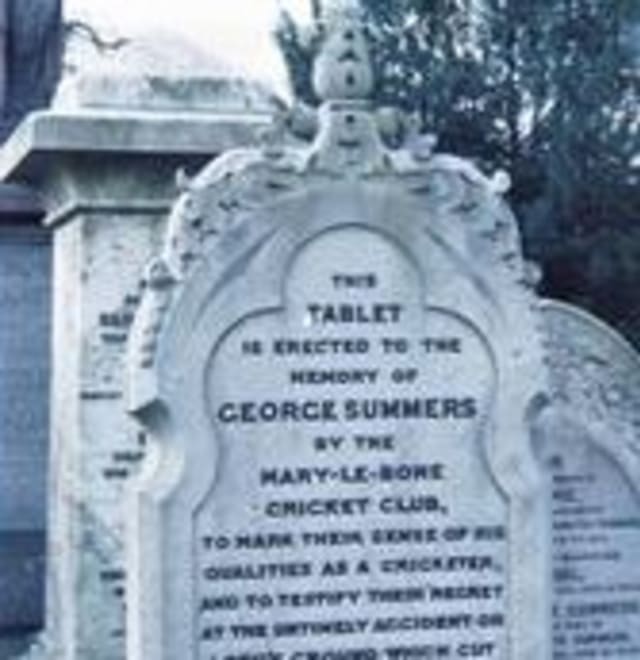A memorial stands in Nottingham’s General Cemetery, raised by the MCC in honour of George Summers, the only Nottinghamshire cricketer to die as a result of injury received on the field of play.
The inscription gives some clue as to why they felt it appropriate expend £30 (a considerable sum in that era) on the memorial:
‘This tablet was erected to the memory of George Summers by the Mary-le-bone Cricket Club to mark their sense of his qualities as a cricketer and to testify their regret at the untimely accident on Lord’s ground which cut short a career so full of promise. June 19th, 1870, in the 26th year of his age.’
The tragedy did indeed occur at Lord’s, during the Nottinghamshire v MCC match in June 1870.
Nottinghamshire batted first and Summers went in first wicket down with the County’s score standing at 29. With the addition of a further ten runs, Bignall’s wicket fell and Daft joined Summers. The pair added 129 for the third wicket when Summers was bowled by a shooter from Platts. He had played an excellent innings of 41.
When Nottinghamshire batted again the first ball which Summers received, bowled by Platts, struck him on the cheekbone. He was carried insensible from the field and although he recovered sufficiently to return to Nottingham – against medical advice – George Summers died at his home four days later on 19 June 1870.
Accounts differ as to exactly where on the head Summers was struck but all agree that he was stunned by the blow. The Nottinghamshire Guardian reported that the ball “struck him a violent blow on his head, the ball missing his temple by about half an inch. Summers reeled backwards senseless.”
Notts captain Richard Daft, the next man in, emerged with his head draped in a towel as a form of protest.
WG Grace, a qualified doctor, was in the MCC team that day and recorded the incident in his memoirs: “When the accident happened no-one imagined that it would end fatally, but the next day Summers unwisely appeared on the ground in the blazing sunshine…”
It is not clear if the good doctor attended to Summers, though one account does say, “Cricket's most famous doctor read the pulse, took his time, then announced that Summers was alive.”
There were several factors in the eventual demise of George Summers, not least his apparent insistence on watching a match between the MCC and the Civil Service in the June heat next day, from an armchair just outside the Tavern. Grace was among many to observe that “…the fatal consequence might have been obviated if Summers had been persuaded to rest awhile.”
The rigours of a return train journey to Nottingham, in an era when rail travel was a bumpy ride at best, must also have had a contribution to the tragedy.
Grace is not alone in identifying the Lord’s pitch as another – crucial – factor; “At that time…Lord’s Ground was in a most unsatisfactory condition – so dangerous that some cricketers declined to play there.”
Sussex CCC refused to play at Lord’s in 1864 because of the state of the pitch and WG reported, “The ball was certainly a short one but it was the condition of the ground that made it bump.
“The bowler was not in the least to blame for the catastrophe but he was most terribly cut up…”
That bowler, Jack Platts of Derbyshire, was making his First-Class debut and, unsurprisingly, is reported to have given up fast bowling (though one report does suggest he bowled a bouncer at the be-towelled Richard Daft) in favour of medium pace and occasional off breaks.
As the MCC memorial states, Summers was ‘so full of promise’ - a fine batter with an excellent defence and a good fieldsman at cover point or long leg. He first played for the XXII Notts Colts in August 1864 and again in April 1867. His debut in First-Class cricket was for Nottinghamshire v Middlesex at Islington in June 1867, when he scored 29 and 37; he appeared in all but one of the Nottinghamshire matches from that date until his death.
He represented the North v South at Lord’s, Canterbury, The Oval and Sheffield. Summers also turned out for the Players v Gentlemen; in one such game he made 47 out of a team total of just 80.
His First-Class record was 32 matches played, 922 runs scored with a top innings of 57, his only half century (remember that, Grace apart, scores in excess of 50 were much less common in the 1860s) made v Surrey in 1868.
He visited Paris with a Nottingham team in 1864 and scored 90 in one innings, the highest score recorded in his career.
George Summers was born in Nottingham on 21 June 1844; he died at his family home in Station Street, two days before his 26th birthday.
June 2022